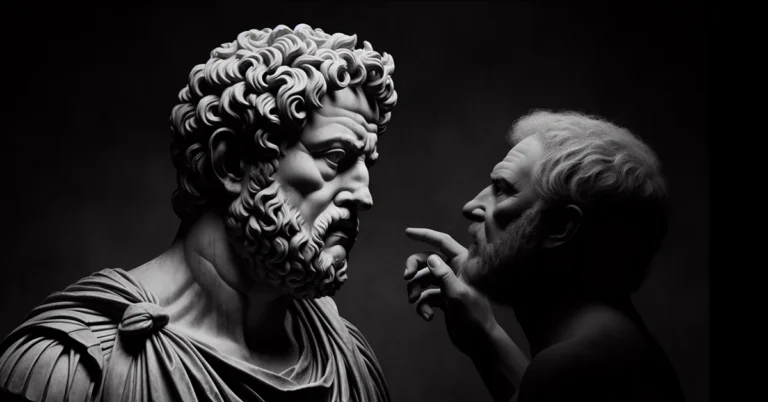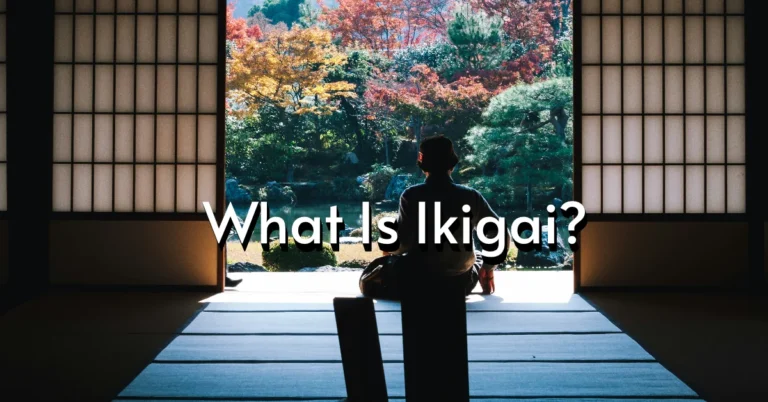Why Should You Train Your Mind?
Train your mind to become the master of your emotions, not their slave. In a world that rewards instant reactions and emotional outbursts, true power lies in the space between what happens to you and how you choose to respond. While feelings will always be part of the human experience, they don’t have to control your decisions, your peace, or your path forward. The difference between living at the mercy of every mood swing and walking through life with unshakeable inner strength comes down to one fundamental skill: training your mind to be stronger than your feelings.
The Stoics knew this centuries ago, and it’s more relevant now than ever.
Your Feelings Lie To You
Your emotions don’t care about your future. They care about comfort, ego, and short-term relief. That’s why following them blindly wrecks your peace, poisons your relationships, and stalls your growth. Developing a strong mind means stepping into the driver’s seat—and staying there.
When you train your mind to be stronger than your feelings, you’re not suppressing your emotions—you’re guiding them. You’re choosing emotional intelligence over emotional chaos. You’re giving yourself the power to stay calm in a crisis, silent in an argument, and focused when it matters most.
The Stoics didn’t preach emotionless living—they taught emotional control. And that discipline is what modern thinkers now call a core skill of emotional intelligence. It’s not about being cold. It’s about being clear.
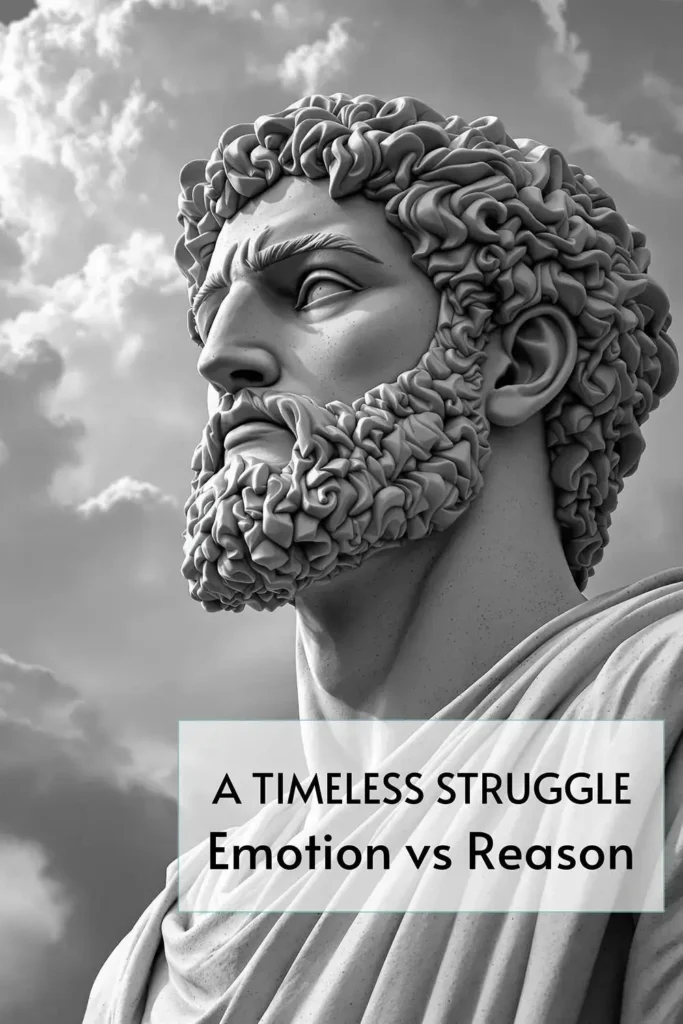
A Timeless Struggle -> Emotion vs Reason in Human History
This isn’t a new war. Reason vs emotion is one of the oldest battles in the human condition. From ancient Greek tragedies to today’s self-destructive habits, the story stays the same: the person who lets emotions lead ends up lost.
The Stoics saw emotions as natural but not sovereign. In their view, it wasn’t anger, fear, or desire that was the problem—it was allowing those emotions to override reason. That’s the key difference between the reactive mind and the stoic mind.
And this is where Stoicism meaning becomes clear. It’s not about ignoring your feelings, but about putting them in their proper place. Stoicism is emotional training for the soul. It’s building a life where your decisions are aligned with reason, not hijacked by moods.
The Stoic Philosophy Behind Emotional Mastery
Stoicism philosophy is built on the idea that true power lies within, specifically, within your ability to govern yourself. That’s why Marcus Aurelius Stoic quotes like “You have power over your mind, not outside events. Realize this, and you will find strength.” still hit hard centuries later.
The Stoics believed emotional mastery wasn’t about escaping hardship, but facing it with clarity and calm. Their wisdom is simple, but brutal: control yourself, or be controlled by everything else.
They trained their minds like warriors trained their bodies—daily, deliberately, and without excuses. And this stoic mindset—rooted in courage, wisdom, and temperance—is exactly what modern people are missing.
When your mind is grounded in Stoic practice, you stop being a victim of your moods. You start responding, not reacting. That’s not just mental strength. That’s freedom.
What Does It Mean to Be Stronger Than Your Emotions?
Train your mind and master your emotions. It doesn’t mean ignoring them—it means understanding them without letting them rule you. The Stoics didn’t see emotions as enemies, but as natural responses that need to be disciplined by reason. To be stronger than your emotions is to build a strong mind—one that can face discomfort, delay gratification, and choose wisdom over impulse.
This mindset isn’t some modern invention. It’s the core of Stoic beliefs, deeply rooted in ancient philosophy and practiced by names like Marcus Aurelius, Seneca, and Epictetus. And it’s just as relevant today—especially if you’re serious about real emotional strength.
What Is Stronger Than Emotions?
A strong mind. One that has been trained to think clearly when it hurts. One that doesn’t flinch at discomfort. The Stoics believed that emotions are signals, not commands. You feel them, you acknowledge them, but you don’t obey them.
That’s the foundation of Stoicism beliefs—that reason, not emotion, should guide our actions. Emotional strength isn’t about being numb. It’s about knowing that feelings are temporary, but your values and principles are not.
As Marcus Aurelius wrote in Meditations:
“If you are distressed by anything external, the pain is not due to the thing itself but to your estimate of it—and this you have the power to revoke at any moment.”
You are not weak for feeling. You are only weak when you let those feelings dictate your behavior.
Who Said “Train Your Mind to Be Stronger Than Your Feelings”?
The phrase may sound modern, but the principle comes straight from Marcus Aurelius, the Roman emperor and philosopher. His teachings—recorded in Meditations Marcus Aurelius—are full of Stoic quotes urging self-control, inner strength, and rational action.
His writings are its soul:
“You have power over your mind – not outside events. Realize this, and you will find strength.”
— Marcus Aurelius, Meditations
In other words: master your mind, or everything else will master you.
This mindset, the ability to stand firm while emotions pull in every direction, is why his words are still quoted centuries after his death. Among the best Marcus Aurelius quotes, this one echoes a timeless truth: strength begins in the mind.
You Are Not Your Feelings — and That’s a Power Move
Most people collapse because they believe every emotion they feel. But here’s the Stoic mindset meaning in one sentence: you can observe your emotions without becoming them.
The moment you realize “I feel anger” is different from “I am angry,” you’ve already won the first battle.
The Stoics practiced this mental separation daily. It’s not denial—it’s developing a strong mind that can hold space between stimulus and response. And that gap? That’s where your freedom lives.
When you define yourself by what you value instead of what you feel, you gain a kind of strength most people never even aim for. This is the stoicism definition in action: reason over reaction. Intention over impulse.
You are not your feelings. You are the observer of them. The commander of them. Own that role.
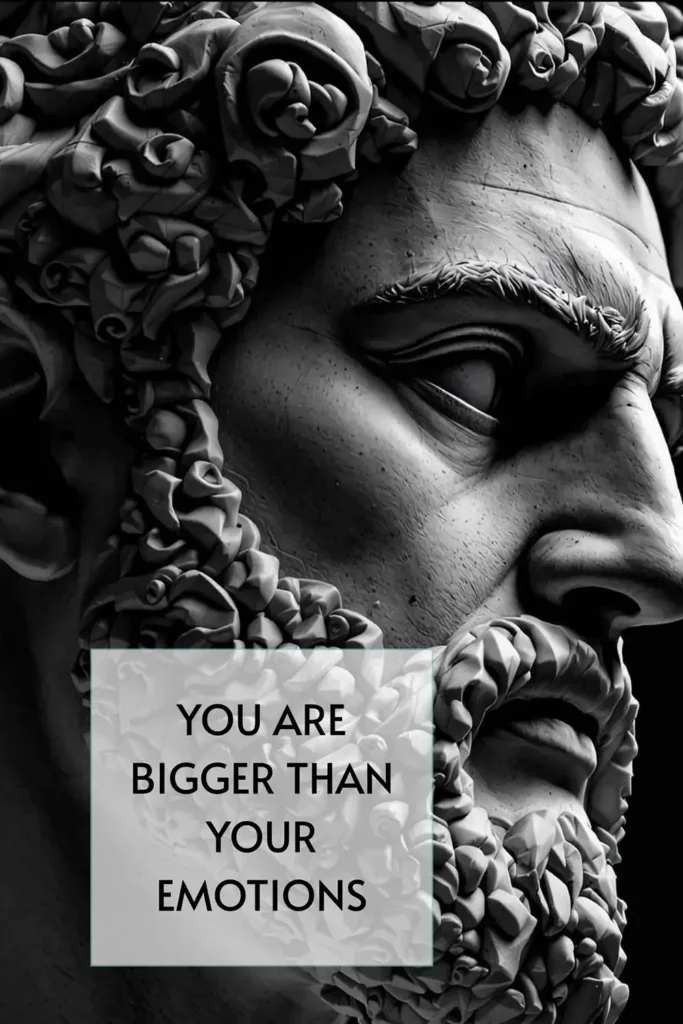
You Are Bigger Than Your Emotions
The Stoics believed that no external chaos, war, death, or betrayal could break a person whose inner fortress was solid. And that fortress? It’s built by understanding one truth: you are bigger than your emotions.
This is the heart of Stoicism that Marcus Aurelius practiced. He dealt with betrayal, war, and plague, and still ruled himself before ruling an empire. That’s the Stoic mindset: you face the storm, but you are not the storm.
Developing a strong positive mindset doesn’t mean smiling through pain—it means staying grounded, thinking clearly, and choosing wisely, even when everything in you screams otherwise.
The Stoics weren’t superhumans. They were simply trained. And they trained their minds to lead, not follow. You can do the same.
Fixed Mindset vs Growth Mindset — The Stoic Take
Modern psychology talks about the growth mindset and fixed mindset, but long before those terms ever existed, the Stoics were already living that philosophy out loud. They knew that your mental operating system—how you process failure, discomfort, and self-doubt—defines your potential more than talent ever will.
At the heart of Stoic practice is the idea that you can grow beyond what you feel in the moment. The mind, when trained, becomes a weapon against chaos. A growth mindset isn’t new. It’s ancient. It’s Stoic. And it’s how you stop being a slave to every fleeting emotion and start becoming someone unshakeable.
What’s Stronger Than a Feeling?
Emotions scream. A disciplined mind listens—but doesn’t obey.
Feelings are loud, reactive, and impatient. But a strong mind is deliberate. It pauses. It decides. That’s what Stoic philosophy trained people to develop: a mind that can hold the line, even when everything else is pulling you toward impulsive action.
If you want to train your brain to be stronger than your emotions, you need daily discipline. Just like muscles don’t grow from one workout, your mindset doesn’t get stronger from reading one quote. You train it. Repeatedly. Through reflection, journaling, pausing before reacting—building the stoic mind one decision at a time.
And once your mind is stronger than your emotions? You stop being manipulated by people, pressure, or panic.
The Trap of the Fixed Mindset -> When Emotions Run the Show
A fixed mindset doesn’t just hold you back, it sets you up for failure in disguise. It whispers things like, “I can’t help how I feel,” or “That’s just how I am.” But what it’s saying is: “I’ve surrendered my power.”
When you operate with a fixed mindset, you’re always at the mercy of how you feel. And when your emotions run the show, logic gets kicked out of the room. That’s how people sabotage progress—by reacting instead of reflecting.
This emotional autopilot is also a sign of lacking emotional intelligence. You get angry, so you yell. You feel insecure, so you blame. You feel jealous, so you shut down. That’s not strength. That’s being a passenger in your own life.
The Stoics warned against this closed mindset long before psychology ever did. They knew that without mental flexibility, one becomes emotionally fragile and easy to break.
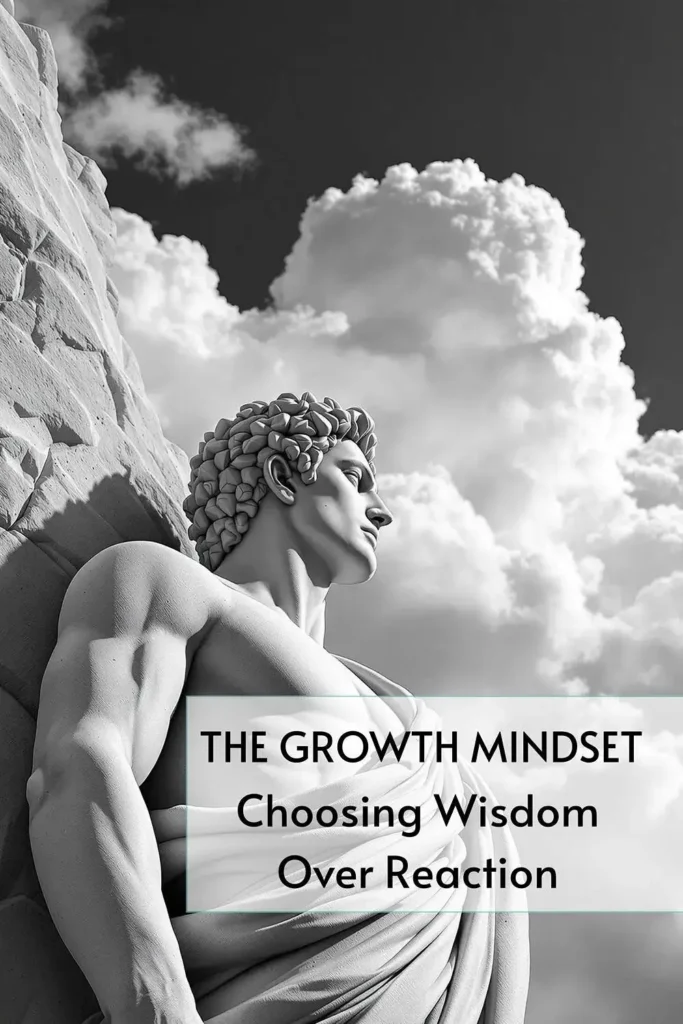
The Growth Mindset: Choosing Wisdom Over Reaction
A growth mindset is the belief that you are not stuck with the emotional reactions you were born with. It’s the understanding that pain isn’t punishment—it’s practice. It’s not “Why is this happening to me?” but “What is this teaching me?”
The Stoics were all about this perspective. A growth mindset, to them, meant seeing obstacles as fuel. It meant letting hardship shape you into someone better, not bitter. And most of all, it meant choosing wisdom over reaction.
This is emotional intelligence in motion. The ability to read your state, regulate your response, and still act according to your principles, not your feelings. That’s the Stoic version of growth: mastering your inner world so you can move freely in the outer one.
Stoicism as the Original Growth Mindset
Before psychology gave it a name, Zeno of Citium—the founder of Stoicism—was teaching it. His entire philosophy of Stoicism was built on one radical idea: Your thoughts shape your life more than your circumstances ever will.
So, what is Stoicism? It’s not detachment. Its development. It’s the mental upgrade you earn by facing life head-on and choosing reason, no matter how loud your feelings get.
The Stoic mindset is the original growth mindset. It sees suffering as schooling. It sees delay as discipline. It sees failure as feedback. Marcus Aurelius didn’t grow into a wise leader by accident. He journaled. He reflected. He practiced. And his words—recorded in Meditations—show a man building himself from the inside out.
That’s not just philosophy. That’s transformation.
The Stoic Blueprint for Mental Strength
Building mental strength isn’t about pretending you don’t feel anything—it’s about learning how to think clearly while you feel everything. The Stoics didn’t aim to kill emotion. They trained themselves to master it, so they could act according to reason, virtue, and principle, no matter the emotional weather.
If you want a mind that doesn’t panic, doesn’t flinch, and doesn’t quit, you need a blueprint. And that’s exactly what Stoicism offers: a battle-tested approach to developing a strong mindset, forged through reflection, repetition, and ruthless honesty.
How to Train Your Mind to Be Stronger Than Your Feelings
Your mind doesn’t automatically become strong just because you want it to be. Like a muscle, it grows under pressure—but only if you resist the urge to give up. To train your mind to be stronger than your feelings, you need clarity, consistency, and constraint.
Here’s how the Stoic mindset handles it:
Pause before you respond. The moment between emotion and reaction is where strength is built. That gap is everything.
Journal your impulses. Writing is a Stoic ritual. Put your thoughts on paper, and you take away their power to control you.
Expose yourself to discomfort on purpose. Cold showers, fasting, silence, rejection—whatever makes you flinch is your training ground.
The goal isn’t to erase emotion. The goal is to become someone who can feel everything—and still do the right thing. That’s a strong mindset. And the Stoics were doing it before it was cool.
How to Become Emotionally Resilient Without Numbing Yourself
Emotional resilience isn’t about becoming numb. It’s about becoming aware. The more you understand your emotions, the less likely they are to dominate you. That’s emotional intelligence—not the soft kind, but the strategic kind. The kind the Stoics lived by.
The Stoic definition of strength was rooted in this:
“He who is brave is free.” — Seneca
And bravery doesn’t mean avoiding pain. It means staring it in the face and staying conscious.
Here’s how to build emotional awareness the Stoic way:
Name the emotion. “I feel angry” is already stronger than “I am angry.”
Trace it back to the thought. Ask: What belief is triggering this?
Separate signal from story. The emotion may be valid. The interpretation probably isn’t.
The Stoics weren’t robotic. They felt. But they refused to let feeling become fate. They made space between emotion and identity. That’s the kind of resilience that doesn’t need to hide or numb—it just leads.
Seneca, Epictetus, and Marcus Aurelius on Self-Command
The ancient Stoics weren’t theorists—they were tacticians. And their writings remain unmatched manuals for self-command.
Seneca, in Letters from a Stoic, said:
“We suffer more often in imagination than in reality.”
Control your mind’s narrative, or it will control you.
Epictetus, once a slave, taught freedom through discipline. One of his most famous quotes:
“No man is free who is not master of himself.”
This wasn’t metaphor. He meant it literally. Self-command is freedom.
And then there’s Marcus Aurelius, whose Meditations weren’t written to impress—they were written to survive:
“You have power over your mind — not outside events. Realize this, and you will find strength.”
That one quote alone could rewire your life—if you actually lived it.
These three men faced exile, slavery, war, and loss. And still, they ruled themselves. Their secret? They didn’t wait to feel strong. They practiced strength until it became who they were.
Mental Training as Daily Practice, Not a One-Time Choice
Your mind isn’t a machine you flip on—it’s a garden. If you don’t cultivate it daily, weeds grow automatically. That’s why the Stoics treated mental training as routine maintenance, not motivation-based bursts of effort.
Here’s the practical Stoicism blueprint for daily strength:
Morning prep (as Marcus did): visualize the day and its potential annoyances. Pre-arm your mind.
Midday check-in: ask, “Am I in control of myself—or reacting?”
Evening reflection (Seneca’s ritual): review what you did well, what you regret, and how to improve tomorrow.
These aren’t just self improvement habits—they’re shields. They guard your mind against modern chaos. Over time, this practice makes you unshakable, even when everything around you is unstable.
The secret to developing a strong mind isn’t a secret at all. It’s repetition. Train your mind – ’cause it’s philosophy applied like clockwork.
How to Be Stronger Than Your Emotions
Theory means nothing if it can’t survive real life. And Stoicism? It wasn’t built in classrooms—it was built in battlefields, courtrooms, prisons, and family dinners gone sideways. The Stoics weren’t philosophers who sat in quiet rooms all day. They were leaders, slaves, teachers, and emperors dealing with people, pressure, and pain.
That’s why their mental strength wasn’t performative. It was practical.
So if you want to be stronger than your emotions, stop waiting for the perfect moment to meditate. Start right where it counts: in traffic, in conflict, at work, at home—when emotions try to hijack your clarity.
How to Be Stronger Emotionally
Emotions aren’t the enemy. Your reaction to them is. The Stoics knew that trying to suppress emotions only gives them more power. The goal isn’t to resist your emotions—it’s to respond to them with wisdom.
Now let’s repeat the steps on how to be stronger emotionally, the Stoic way:
Step 1: Pause. No matter what’s happening, buy yourself a gap. That pause is your advantage.
Step 2: Name the emotion. “I’m feeling frustrated” is better than just being frustrated. That’s emotional intelligence in action.
Step 3: Ask what’s within your control. Epictetus said it best:
“Make the best use of what is in your power, and take the rest as it happens.”
This is what true Stoic control looks like—not cold detachment, but clear awareness. You aren’t avoiding emotions. You’re steering through them.
The Art of Detachment
Detachment is misunderstood. It’s not ignoring your feelings. It’s not becoming them. That’s the Stoic mindset: you feel anger, but you don’t slam the door. You feel envy, but you don’t sabotage. You feel fear, but you don’t shrink.
This is the skill of emotional self-awareness—recognizing the emotion without fusing with it. And once you develop that skill, you become incredibly powerful. Why? Because you no longer act based on emotional impulse. You choose your response.
To start developing emotional intelligence like a Stoic:
Practice daily reflection. What emotions showed up today? Why?
Use journaling to create space between thought and action.
Focus on what kind of person you want to be, not how you feel in the moment.
That’s detachment. Not apathy. Alignment. You align with your values, not your moods.
Examples of Emotional Strength in Everyday Conflict
It’s easy to talk philosophy when life is calm. But what about:
When someone insults you in front of others?
When a coworker takes credit for your work?
When a family member tests every boundary you have?
These are the moments where emotional strength is either proven or exposed.
The Stoics would say:
“When someone does you wrong, consider: ‘What virtue is being tested right now?’”
That’s not weakness. That’s strategic self-control.
In Stoicism, every conflict is an opportunity to practice one of the four Stoic virtues:
Courage: Stay grounded when challenged.
Temperance: Don’t say the first thing that comes to mind.
Justice: Don’t lower yourself to get even.
Wisdom: Ask what outcome actually matters—not what your ego wants.
These are social-emotional skills the modern world lacks, and Stoicism is the antidote.
Emotional Intelligence at Work and in Relationships
Work and relationships are emotional minefields because both require collaboration, compromise, and conflict management. And if you don’t know how to manage yourself, you won’t be able to manage anything else.
High emotional intelligence at work looks like:
Remaining calm when others panic
Listening instead of defending
Leading without needing to dominate
This isn’t about being passive. It’s about being effective. People with strong social skills don’t avoid tension—they handle it with poise.
In relationships, this means:
Disagreeing without escalating
Expressing emotion without emotional blackmail
Creating space instead of exploding
All of this requires professional growth and development, not in degrees, but in discipline. And this is where Stoicism shines. Because when your mind is strong, you don’t get pulled into every emotional current. Train your mind so you lead. Quietly & powerfully.


